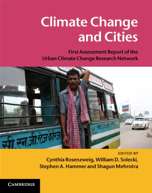New report on climate change and cities a 'wake-up call' for global policymakers

More than half the world's population live in cities, many of which are increasingly vulnerable to the impacts of climate change. But cities are also emerging as the innovative “first responders” in dealing with climate change, says a major new report led by researchers at Columbia University and the City University of New York (CUNY) and published by Cambridge University Press.
The report, “Climate Change and Cities: First Assessment Report of the Urban Climate Change Research Network (ARC3),” is a comprehensive study detailing the risks global cities face due to a warming world. The report, which includes contributions from 110 authors in 50 cities, also explains how urban populations are working to reduce their greenhouse gas emissions and prepare for the impact of climate change, such as increased heat waves, drought and flooding. Climate trends and projections for twelve cities in Africa, Asia, Latin America and the U.S., including Athens, Dakar, Delhi, Harare, Kingston, London, Melbourne, New York, São Paulo, Shanghai, Tokyo, and Toronto, are analyzed in depth.
“This study should serve as a wake-up call about the need to make cities a key focus of global climate change research and response efforts,” stated Cynthia Rosenzweig, a climate impacts scientist at the NASA Goddard Institute for Space Studies and the Center for Climate Systems Research, part of the Earth Institute at Columbia University, as well as one of the co-editors of the report. Work on the report was convened by the Urban Climate Change Research Network (UCCRN), a global coalition of researchers specializing in climate change from an urban perspective. UCCRN was founded at the Earth Institute in 2007.
Some key findings that illustrate the urgent need for improved urban preparedness and planning include:
• Urban climate change risk results from a combination of hazards, vulnerabilities, and adaptive capacity. In the twelve cities listed above, average temperatures are projected to rise between 1°C and 4°C by the 2050s, increasing extreme weather events including heat waves.
• Coastal cities should expect to experience more frequent and more damaging flooding related to storm events in the future due to sea level rise. Particularly at risk are populations like those living in slums located in the lagoons of Lagos.
• In many cities, the quantity and quality of the energy, water, and transport systems will be significantly affected by the projected increases in both flooding and droughts. In developed country cities, leakage from the water supply distribution system can be severe, resulting in system losses of between approximately 5 percent and more than 30 percent. Developing country cities may use informal distribution systems, which can be even more vulnerable but whose loss is not as quantifiable.
“Climate change will stress cities in many ways,” added William Solecki, director of the CUNY Institute for Sustainable Cities at Hunter College, and co-editor of the study. “There will be more heat waves, threatening the health of the elderly and infirm. Droughts will also become more commonplace in many cities, while in coastal communities too much water may be the problem, due to sea-level rise and more extreme coastal flooding.”
The report notes that there are several positive cases of urban climate change actions that can inspire local government officials in their own planning efforts. “Cities are developing comprehensive climate action plans, but we’re a long way from being prepared, particularly to meet the needs of the world’s poorest urban residents, who are also the most vulnerable,” suggested Shagun Mehrotra, managing director of Climate and Cities at the Center for Climate Systems Research and co-editor of ARC3. “Acting decisively, and acting now, means crafting pathways to sustainable future cities. The greatest gains in city climate-risk reduction will occur from mainstreaming science-based analysis into ongoing and planned infrastructure investments by private and public sectors.”
International organizations led by the World Bank, Cities Alliance, and UN-HABITAT, along with C40, a group of large cities committed to tackling climate change, and ICLEI – Local Governments for Sustainability, are enabling cities to scale-up these efforts.
By focusing on proposed solutions, the report is a resource for policymakers and researchers seeking to make more informed decisions about how to manage the impacts of climate change, as well as reduce their contribution to the problem. It is structured around key themes to help public officials understand the role their existing urban planning systems can play in addressing climate change, in addition to detailing impacts to local energy systems, water supply, transportation, and public health. The book offers guidance on how cities can assess their climate risks and provides examples of how 48 different cities around the world are implementing strategies for adaptation and mitigation.
“We’ve tried to create a comprehensive study that explains both the challenges and opportunities facing local government managers. It’ll also be a great classroom tool, one that we hope will train the next generation of climate change researchers and policymakers,” explained Stephen Hammer, an energy policy expert who served as co-editor and lead author of one of the chapters.
Rosenzweig and Mehrotra will be participating at the C40 Large Cities Climate Summit in São Paulo, Brazil from May 31–June 3, 2011. The report will be launched, along with the United Nations “Cities and Climate Change: Global Report on Human Settlements 2011,” by Joan Clos, United Nations under-secretary general and executive director of UN-HABITAT, and Marcelo Ebrard, mayor of Mexico City and chair of the World Mayors Council on Climate Change, at the ICLEI Resilient Cities 2011 in Bonn, Germany from June 3–5.
Provided by Columbia University















